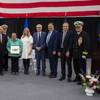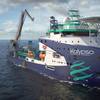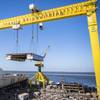Durrell, Irving Shipbuilding Eye $35B Shipbuilding Deal
5 Minutes With Steve Durrell, President, Irving Shipbuilding
As it is the builder of 80% of Canada’s current Surface Combatant fleet, Halifax, Nova Scotia-based Irving Shipbuilding is justifiably confident in its bid to win a sizable portion of the Canadian government’s estimated $35b National Shipbuilding Procurement Strategy contract. With the award announcement expected mid-October, on the eve of his yard potentially winning the biggest deal in its history, Maritime Reporter & Engineering News sat down with Steve Durrell, President, Irving Shipbuilding, in his office to discuss his team’s precise planning, daily dedication and corporate commitment to building a world-class shipbuilding and repair operation.
Tell us a bit about yourself.
I graduated Maine Maritime Academy in 1984, after which I moved to Saint John, New Brunswick, and started with the Irving Group sailing with the Kent Lines for about nine months. In 1985, I started in the Frigate Program as a propulsion system engineer; in fact, I started at Saint John the week we cut steel for HMCS Halifax, which is in mid-life refit (at Irving Shipbuilding) right now, so it’s come full circle. I’ve had a little more than 26 years with the company. I came to Halifax in 1994, and I started on the ship repair side. I became ship repair manager of the ship repair group, and then led the commercial group before becoming president of the shipbuilding operation in 2008.
How would you describe your management philosophy?
The shipbuilding business is, by nature, a project-based business. The projects can span years and require crisp metrics, expert project management and the amalgamation of disparate disciplines and processes into one cohesive path to deliver a finished vessel of the highest quality, on-time and on-budget. We have long-standing relationships with a relatively small number of clients, with repeat business absolutely critical to our long-term success. My approach to business success is to ensure all 1,200 employees understand exactly where the organization is headed (through consistent, repeated communication of our vision), how we plan to achieve our objectives, and that they each play an intrinsic role in that success. Everything we do in the organization can be categorized under one of three planks of our mission, to be project-driven, process-centered and people-focused. We measure our success against our balanced scorecard and I share those results with the entire organization on a regular basis. We all benefit when we do well, and we all focus on the areas to be improved. We celebrate our successes together – as families. I communicate as often as possible and listen to our employees concerns and suggestions. And we are all focused on how to be better, with formal continuous improvement processes driving our core business each and every day. The ships we build are huge, highly technical steel vessels, but our business comes down to people … the skilled, experienced workers who build those vessels and the men and women in uniform who sail them.
In walking the halls, I noticed an award conferred on Irving Shipbuilding from ExxonMobil. How was that earned?
ExxonMobil was a great customer, not just in giving us the work, but you also learn a lot from the oil majors with their great management systems and safety philosophies. They are very open and nothing is proprietary when it comes to safety; they want to share their safety philosophy, and that is something we believe as well. We want to be a safe industry and have everyone understand the importance of our safety culture. I tell people: we work in confined spaces, we work at heights; we work in awkward positions; we do hot work … and sometimes we do that all at once. So you have to be extremely conscious of the work environment, and safety is of the utmost importance.
Which investment do you see as being the key to you shipbuilding capability, today and tomorrow?
Building now for the future was a philosophy, and we are fortunate to have owners in J.D. Irving, Limited that believe in us; believe in the future of shipbuilding; and are willing to invest and give to us the support we need to help us move forward, take advantage of opportunities and grow the business and industry. The obvious things that you see around our operations, the physical assets, the physical infrastructure upgrades are extremely important. But the single most important investment that we have made is the investment in our people. The training, the safety, the communications investments; these investments are all critical for us to achieve the global high performance standard that we have achieved and that we continue to strive for.
Central to this is the investment in our apprenticeship program, and today we have more than 250 apprentices working in the trades. We have invested in relationships with Community Colleges and Universities, in order to further develop our apprenticeship program and to provide a steady stream of engineering, planning, scheduling and accounting students.
What do you count as your biggest challenge to running an efficient and profitable shipbuilding operation?
On a going-forward basis we’ve been able to having a sustainable work load, avoiding some of the traditional boom and bust cycles in shipbuilding. One of the most significant contributions to that is when our owner decided to build their vessels here instead of going offshore or buying used tonnage; to invest in their fleet and doing so through us. That was critical in allowing us to maintain a sustainable, level-loaded workforce, and that led to additional opportunities. For example, while building these vessels, we were able to bid and win the $194m contract to build the nine mid-shore patrol vessels for the Canadian Coast Guard.
In your career, what is the single most important technological development that has helped to make the business of building and repairing ships more efficient?
Information … no question, it’s information. The speed at which you can acquire information, how you can organize and access information has changed phenomenally. When I started, the fax machine was just coming out and we had one personal computer in the engineering department. Even in the last five years, if you look at the way in which you can access information, with Blackberries and PDAs … you can receive and view so much information that you never have to be out of touch. The speed and the accuracy is just phenomenal.
If you are successful in your bid for the contract via National Shipbuilding Procurement Strategy, how will Irving Shipbuilding change?
We’ve been careful to ensure that all of the work that we’re doing, all the processes we’ve implemented are scalable, scalable to be able to implement the new work. Most visibly you will see the physical plant change. The Ultra Hall that we are proposing will be visible from outside the gate; there will be physical changes that anyone driving down Barrington Street will notice easily. I think one of the other changes we will have will be in our workforce. We will have that long-term future, the feeling of having a sustainable future, and our workforce will feel confident making the investment in homes, cars and other big purchases.
What is the importance of this contract to the Halifax Maritime Cluster as a whole?
The economic impact is going to benefit everything, from the educational systems, to our partnership with the Halifax Marine Research Institute, which has a very broad, pan-Canadian approach to helping the overall marine industry. Our winning this will have a benefit across Canada our extensive web of suppliers. It’s not just the hardware business of building the ship that will benefit. Our supply base runs deep, and includes everything from taxis and caterers all the way up to steel suppliers and equipment suppliers. It’s a very broad range of direct suppliers that we have.
What else do you see as key drivers for the shipbuilding business going forward?
The East Coast offshore business is a big sector that we are continually looking at, as we have built five offshore supply ships for the East Coast offshore, and have completed a number major overhauls of rigs, and built platforms. That’s not only a big driver for us, but for the economy in general.
Investing in Employees Pays Dividend
Irving Shipbuilding’s management team espouses an investment in its employees as critical to its long-term success. Investment in this regards entails a broad range of initiatives from the grass roots investment in its own in-house apprenticeship program and relationships with community education centers to ensure a steady stream of qualified workers; to investment in constant communications with its team of more than 1,200 to ensure all are on the same page regarding company quality, safety and performance initiatives and objectives. Durrell and company embrace sharing the wealth when times are good, and sharing the responsibility among the entire team to identify and implement change when needed. A thorough tour of the shipyards helps to confirm that this message far exceeds motto and brochure, as Irving’s main shipbuilding facility in Halifax is a modern, well-maintained facility, with a cleanliness and order second to none, and a bustling workforce. Concrete evidence that the strategy is a success come via Irving Shipbuildings annual survey of employees through the independent third-party organization, Tower’s Watson. Since 2008, not coincidentally when Durrell took the helm of Irving’s Shipbuilding operation, the Employee Engagement Score at Halifax Shipyard has risen 62%, scoring a 53 in 2008, and rising to an 86% mark in 2011, meaning the company has achieved a Global High Performance status.
www.shipsstarthere.ca
*As published in the October 2011 edition of Maritime Reporter & Engineering News - www. marinelink.com


















